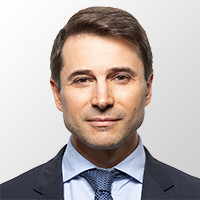On August 26, 2020, the online discussion “Endless Fairy Tale: How Shall Business Owners Play by Newly Changing Rules” was held by EPAM (EPAM) with information support from RBC Pro*. The event addressed the twists and turns of tax laws for companies and individuals in Russia, UK, Liechtenstein, as well as in Cyprus and Malta.
Sergey Kalinin, Partner and head of Tax Practice at EPAM, moderated the event.
Leading tax experts discussed the latest amendments to the tax laws, which involved revised international double taxation agreements, adjusted regulations for qualifying individuals as Russian tax residents, the flat-rate tax for foreign company owners, as well as many other initiatives that should be taken into account by foreign asset holders whether it is capital invested in securities, foreign trade, holding companies, or other entities used for estate planning.
EPAM Tax Counsel Igor Schikow together with Legal Department Manager at EMCS LTD Gayk Ayvazyan and Head of Tax Practice at UFG Wealth Management Maxim Martynov gave specific examples to demonstrate how the revised international taxation agreements with Cyprus and Malta are to affect most common business structures. The detailed analysis of various structures employing companies in those jurisdictions showed how the aggregate tax burden on the UBOs is to change once Russia has started collecting the withholding tax on dividends and interest payments at the increased rate of 15%.
Sergey Kalinin, Partner and head of Tax Practice at EPAM, addressed how asset ownership may be structured involving foreign jurisdictions in the the new tax environment by using a Russian holding / CEF and a “through” approach, and by way of a foreign company voluntarily declaring itself a Russian tax resident. Sergey also covered the key expected amendments in the tax laws and elaborated on the new regulations for controlled foreign companies (CFCs). Rather than pay a tax on the total amount of the income from foreign sources, including the CFC revenues, an individual would be entitled to pay a fixed tax amounting to RUB 5 million and not have to submit respective reports. This change was made to simplify the administration of the CFC laws, as Sergey noted.
Kirill Tkachev, Director of AUDINA TREUHAND AG, explained what should be taken into account when a family foundation is being set up in Liechtenstein. According to the expert, such a foundation is not only flexible in the planning of asset descents and tax events but what is important is that such a foundation also protects the assets and keeps ownership as confidential as possible.
At the end of the discussion, Dmitry Zapol, Partner at UK’s IFS Consultants Ltd, paid special attention to the structuring of an international business using UK companies. He also reviewed the UK’s innovations related to taxes on the incomes generated by high-net-worth individuals. Dmitry’s advice is to invest in non-residential premises as this would mitigate the inheritance tax risks, and in terms of the UK laws, investing via companies would be more efficient than direct ownership by individuals.
* RBC Pro is RBC’s business service.
